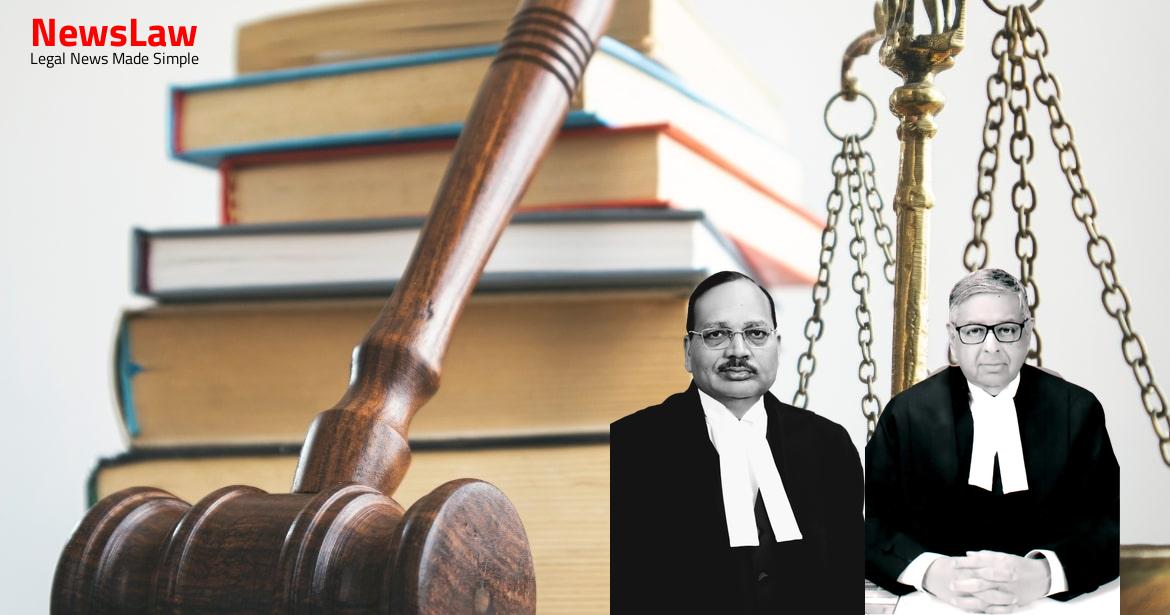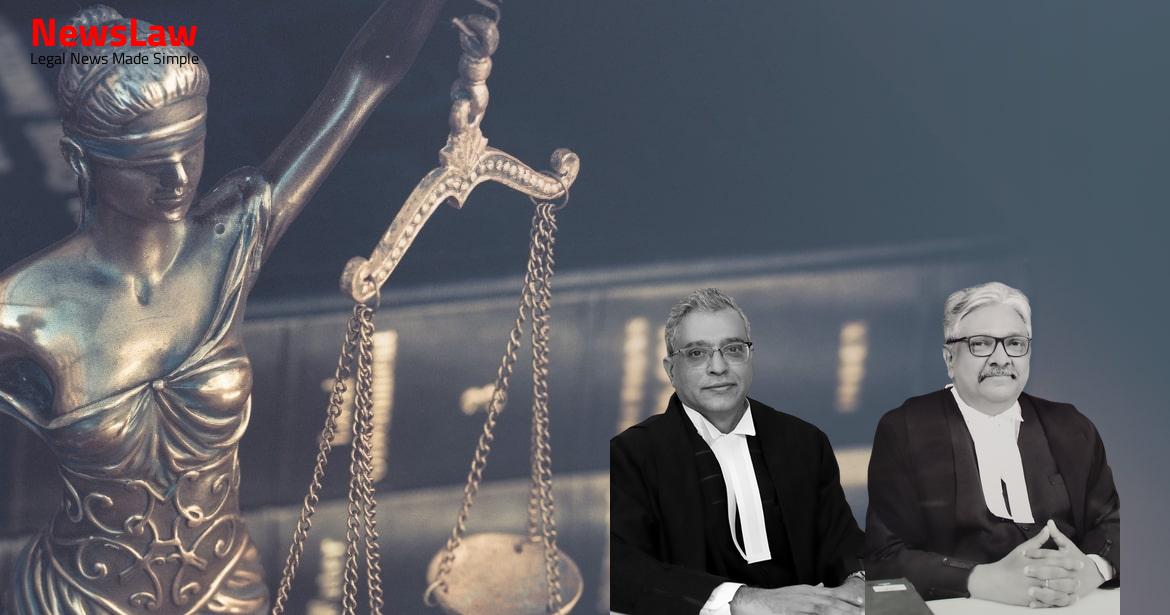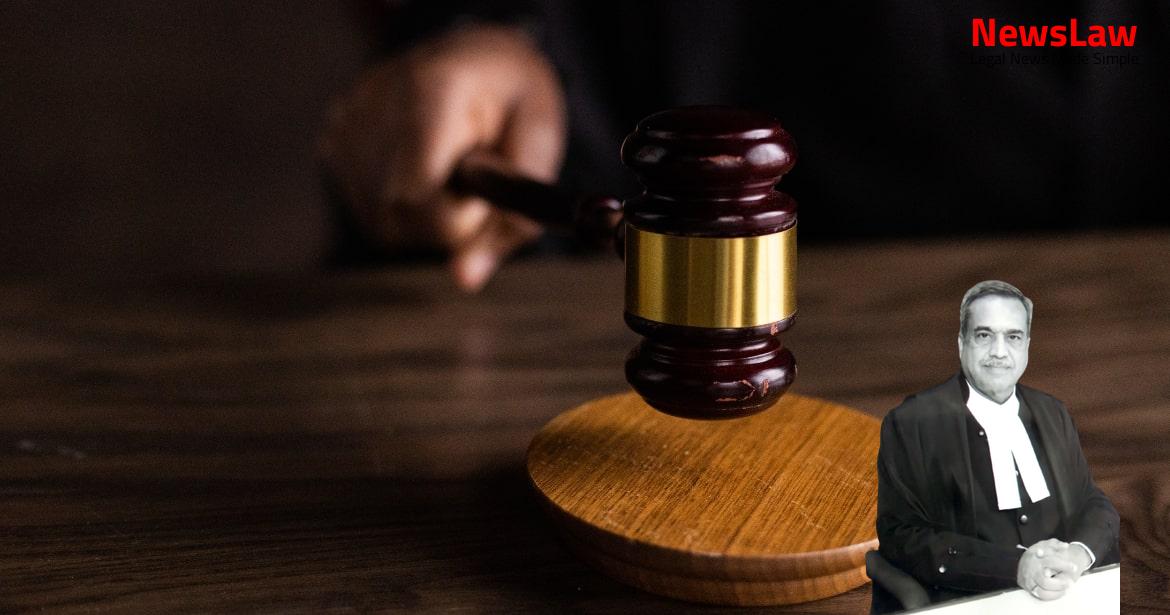Explore the in-depth legal analysis conducted by the court regarding jurisdictional concerns in arbitration cases. The court carefully examined the provisions of the Arbitration and Conciliation Act of 1996, as well as the implications of specific state enactments on works contracts. Through a thorough legal lens, the court addressed the challenges raised by the parties and provided a comprehensive analysis of the applicable laws and procedures.
Facts
- Respondent No. 1 filed Special Civil Application No. 400 of 2002 before the High Court of Gujarat challenging the order of the sole arbitrator.
- The sole arbitrator, on 20.10.2001, rejected Respondent No. 1’s application and affirmed jurisdiction to adjudicate the dispute.
- Appellant appointed Respondent No. 2 as the sole arbitrator to resolve the disputes.
- Respondent No. 1 raised jurisdictional concerns under Section 16 of the Arbitration and Conciliation Act of 1996.
- India’s petition against the order is not maintainable.
- The only remedy for the petitioner is to wait for the award from the arbitrator and challenge it under Section 34 of the Act.
- Respondent No 1 appealed the Single Judge’s order through Letters Patent Appeal No 182 of 2006.
- The High Court of Gujarat, in the impugned order dated 17.09.2012, allowed the appeal.
Also Read: Electoral Malpractices in Mayor Election
Arguments
- The Respondent argued that the contract in question was a Works Contract under the Telangana Value Added Tax Act, 2005.
- They contended that disputes arising from Works Contracts are not arbitrable as per Section 32 of the Arbitration and Conciliation Act, 1996.
- The Respondent further argued that Section 40 of the 1996 Act does not apply to Works Contracts as they fall under a special category of contracts.
- They relied on the decision in State of West Bengal v. Associated Contractors to support their contention that Works Contracts should be excluded from arbitration.
- Section 16(2) of the Arbitration Act mandates sole arbitrator jurisdiction on preliminary issue of jurisdiction.
- Enactment of Gujarat Act substituted Arbitration Act for disputes related to works contract.
- Appellant raised dispute early regarding the forum for adjudication.
- Appellant argued that Appellate Bench erred in interfering with Single Judge’s order under Articles 226 and 227 of the Constitution.
- Final award passed by sole arbitrator is now challenged under Section 34 of the Arbitration Act.
- Contention that Respondent No 1 attempted to bypass Arbitration Act framework by challenging the award after it was passed.
- Respondent No 1 could have invoked writ jurisdiction under Articles 226 and 227 of the Constitution to set aside the arbitration as a nullity due to conflict with State enactment.
Also Read: Balancing Power and Transparency: Electoral Bonds Struck Down, Disclosure Mandated
Analysis
- The Gujarat Act was enacted in 1992 to arbitrate disputes arising from works contracts involving the State Government or public undertakings.
- The Division Bench held that the Gujarat Act, not the Arbitration Act, applies in this case.
- The Respondent challenged the jurisdiction of the sole arbitrator under Section 16(2) of the Arbitration Act.
- The Arbitration Act’s Section 34 provides for recourse to Court only through an application for setting aside an arbitral award.
- Article 227’s broad scope should not be used to interfere with the arbitral process.
- The Appellant acted in accordance with the agreed procedure by unilaterally appointing a sole arbitrator.
- The High Court incorrectly believed the Appellant rendered the Respondent remediless by appointing the arbitrator unilaterally.
- Respondent No. 1 did not challenge the appointment of the arbitrator initially but later raised jurisdiction issues.
- The jurisdiction issue should be first dealt with by the tribunal under Section 16 before court intervention under Section 34.
- Arbitration being a contractual setup, the parties need to abide by the agreed procedure.
- The High Court should not interfere with contractual interpretation issues in writ jurisdiction.
- The Gujarat Act’s application alone may not justify challenging the arbitrator’s ruling under the Arbitration Act.
- Courts should be cautious in interfering with arbitral processes unless there are exceptional circumstances or bad faith.
- Challenges to an arbitrator’s appointment can be made through various procedures and forums provided by the Arbitration Act.
- An application for setting aside an award can only be made within three months of receiving the award.
- The power of High Courts to issue various writs under Article 226 of the Constitution is a basic feature that cannot be curtailed by parliamentary legislation.
- Section 34(3) reflects the principle of unbreakability, where the time-limit for challenging an award begins after the tribunal has disposed of a request for correction or interpretation.
- The power of correction or interpretation of the award should be exercised in exceptional rarity, especially in cases of clear ‘bad faith’.
- The non-obstante clause in Section 5 of the Arbitration Act restricts judicial intervention in matters under Part I of the Act.
- An unbreakable time-limit for applications for setting aside awards is desirable for certainty and expediency.
- Grounds for setting aside an award that emerge after the three-month time-limit has expired cannot be raised.
- High Courts have the discretion to entertain writ petitions under Article 226, but not every petition must be entertained if there is an effective alternative remedy available.
- Section 5 of the Arbitration Act states that no judicial authority shall intervene in matters governed by this Part, except where provided in this Part.
- The purpose of this provision is to reduce excessive judicial interference, as the intention of the legislature is to adopt the UNCITRAL Model Law and Rules.
- This provision is supported by the non-obstante clause, which upholds the legislative intention and aims to limit judicial intervention not contemplated under the Arbitration Act.
- The Section 16 application was dismissed on 09.05.2018 by the Arbitrator.
- The same contention that was accepted by the High Court was raised in the dismissed Section 16 application.
- No appeal is allowed when a Section 16 application is dismissed; challenge can only be made after the final award is passed under Section 34.
- The High Court made an error in using its discretionary power under Articles 226 and 227 of the Constitution.
Also Read: Recall of Resolution Plan Approval: Legal Analysis
Decision
- Contractor failed to communicate his selection of name within the stipulated period, leading to the Chief Engineer appointing a sole arbitrator.
- The arbitration clause in the contract mandated disputes to be adjudicated according to the statute.
- The Chief Engineer or Contractor must select an arbitrator within specific timeframes to avoid time-barred claims.
- The decision of the sole arbitrator is final and binding on both parties.
- All awards must be in writing, and detailed reasons must be provided for awards Rs. 1.00 lakh and above.
- Arbitration is to be conducted in accordance with the Indian Arbitration Act.
Case Title: BHAVEN CONSTRUCTION Vs. EXE ENGINEER SARDAR SAROVAR NARMADA NIGAM (2021 INSC 9)
Case Number: C.A. No.-014665-014665 / 2015



